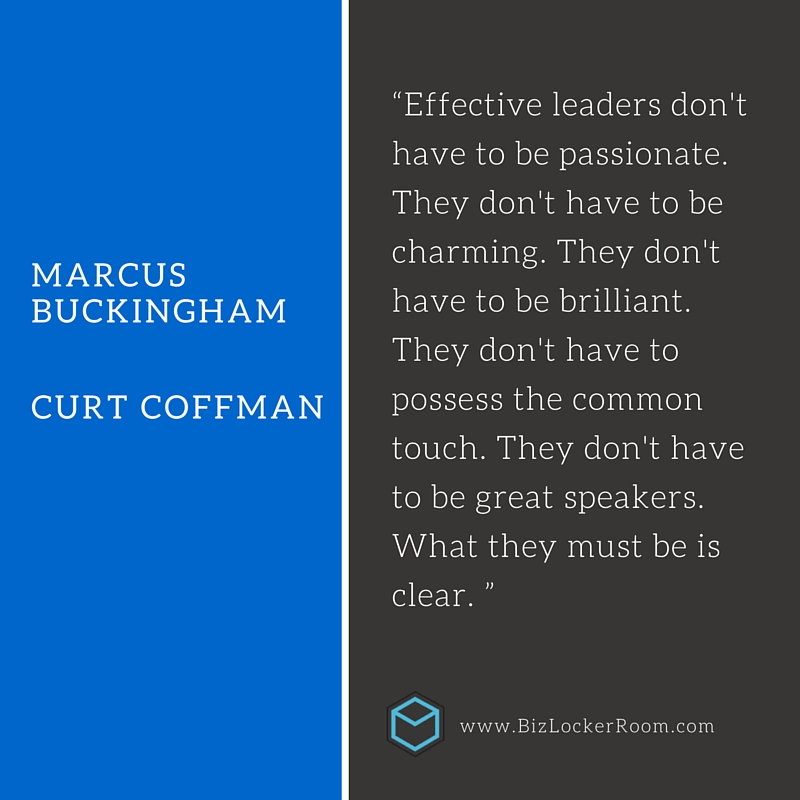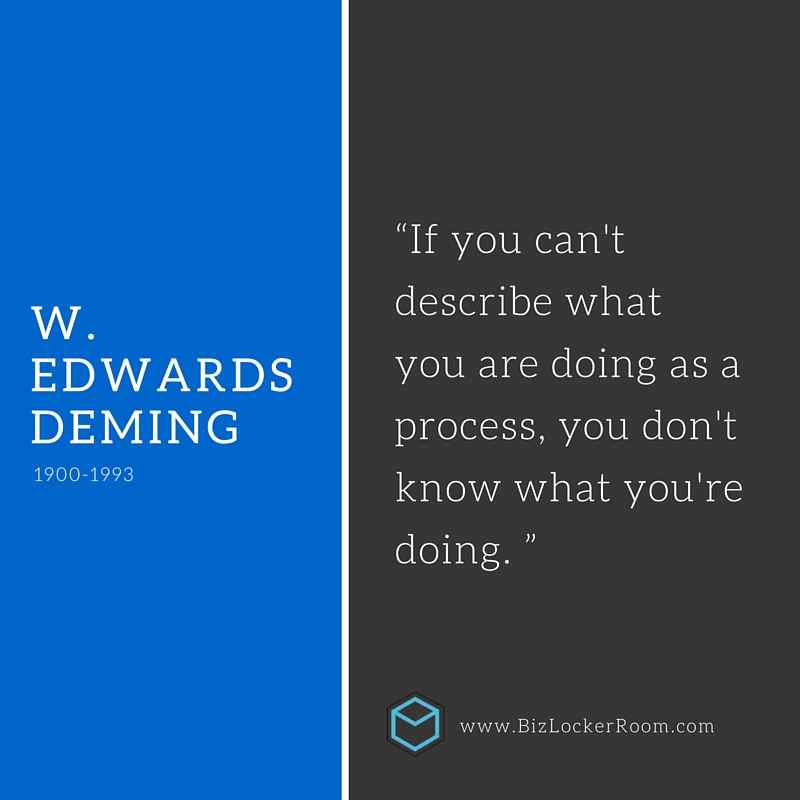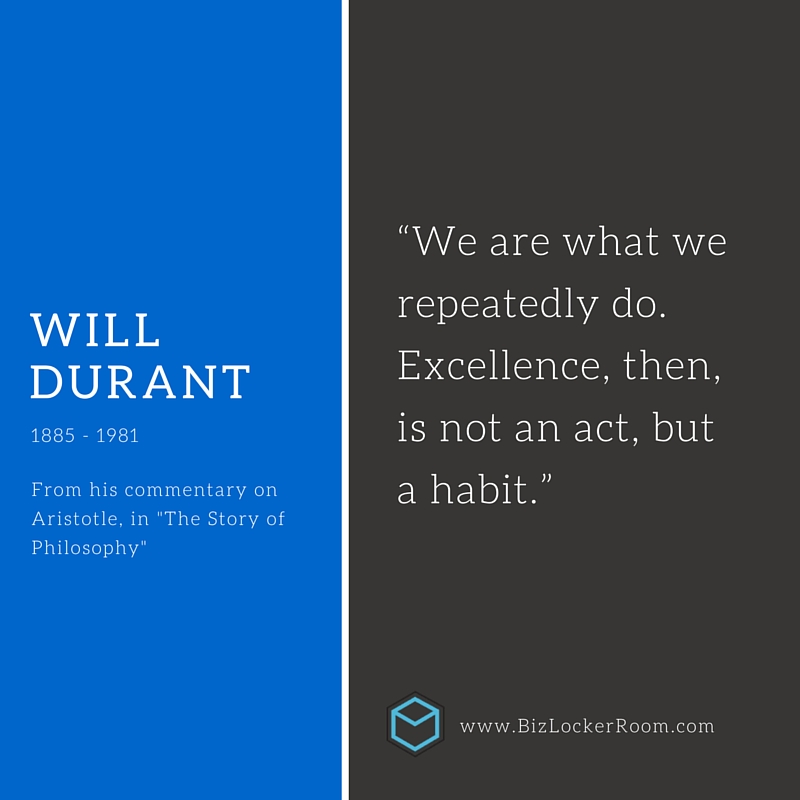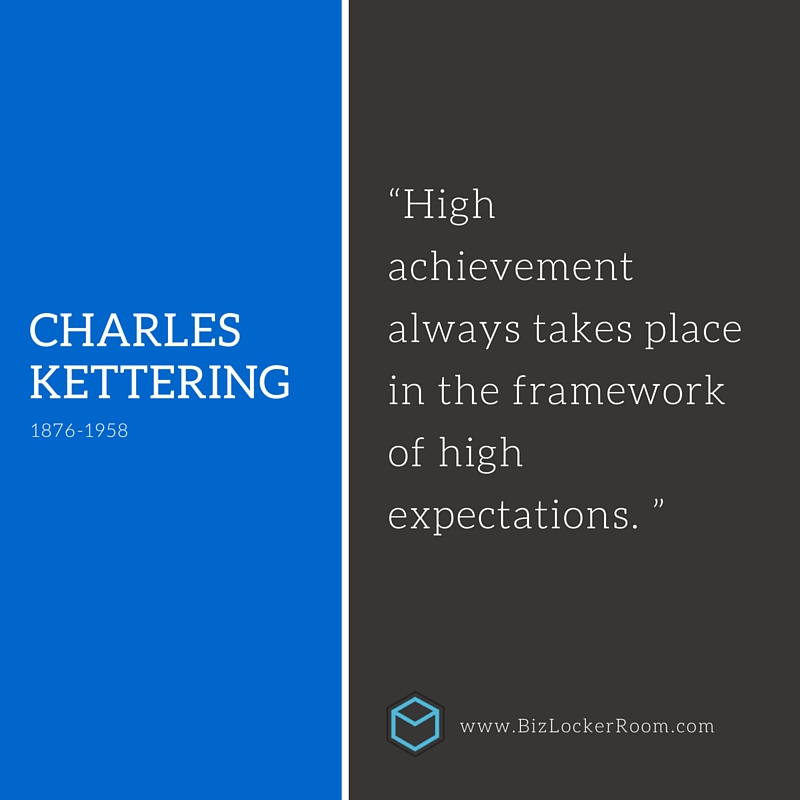by Kelly Riggs
There are tens of thousands of leadership quotes. And most everyone has a favorite or two.
Although there is a tremendous amount of leadership wisdom to choose from, I have taken just four quotations from widely varied sources with the idea of creating a create a strong foundation for effective leadership.
The four quotes that I have chosen address four critical challenges to business success: a lack of clarity, poor (or no) processes, bad habits, and hazy expectations. Addressing these four topics successfully will provide any leader with the opportunity to set an organization on a solid foundation.
 Recruited by Donald Clifton to work at Gallup, Marcus Buckingham is a NY Times best-selling author, motivational speaker, and business consultant.
Recruited by Donald Clifton to work at Gallup, Marcus Buckingham is a NY Times best-selling author, motivational speaker, and business consultant.
Curt Coffman, formerly the Global Practice Leader for employee and customer engagement at the Gallup Organization, “virtually created the engagement movement” in the field of management.
Together, Buckingham and Coffman penned the 1999 book, “First Break All the Rules: What the World’s Greatest Managers Do Differently,” which spent 93 weeks on the NY Times best-seller list. Based on research conducted with over 80,000 managers, the book is ranked as one of the Top 100 Business Books of All-Time.
Among the many significant insights provided in this fantastic work you will find this quotation:
“Effective leaders don’t have to be passionate. They don’t have to be charming.
They don’t have to be brilliant. They don’t have to possess the common touch.
They don’t have to be great speakers. What they must be is clear.”
Fundamental to any organization is the idea of creating clarity. Unfortunately, most companies are simply containers for job descriptions. Employees go to work, fulfill a function, and rinse and repeat weekly – usually without any sense whatsoever of purpose or mission.
But, as Buckingham and Clifton point out, without organizational clarity employees rapidly disengage while productivity, profits, and customer satisfaction languish.
You can give your attention to many different aspects of leadership, but if you don’t solve the problem of clarity in your company those other things really won’t matter.
Questions:
 William Edwards Deming (1900-1993) was an American engineer, professor, author, and management consultant, and is widely recognized as the “father” of the quality movement in business, an example that is followed by many management consultancy firms like cavendishwood.com/ amongst others. He is probably best known as being directly responsible for the resurgence of Japanese industry following World War II and for sparking the revival of Ford in the American automotive industry in the 80s.
William Edwards Deming (1900-1993) was an American engineer, professor, author, and management consultant, and is widely recognized as the “father” of the quality movement in business, an example that is followed by many management consultancy firms like cavendishwood.com/ amongst others. He is probably best known as being directly responsible for the resurgence of Japanese industry following World War II and for sparking the revival of Ford in the American automotive industry in the 80s.
Deming’s book, “Out of the Crisis,” was originally published in 1982 and is also listed as one of the the Top 100 Business Books of All-Time. His famous 14 Points presented in the book serve as key principles for managers to follow in improve the effectiveness of an organization.
The foundation of Deming’s approach to business is process. And if process was the foundation, the cornerstone is likely the Deming (or Shewhart) Cycle, described as Plan–Do–Check–Act.
Deming said this about process:
“If you can’t describe what you are doing as a process,
you don’t know what you’re doing.”
Process development and implementation are critical because they allow any function to be measured, assessed, consistently replicated, and effectively taught. The process can be anything from attracting more customers and increasing traffic to your website to advertising anyone’s new restaurant business drawing stylish inspiration from successful entrepreneurs.
Yet, so many functions within companies lack a well-documented process – the sales and marketing departments being the most prominent examples. But it’s hardly limited to those areas. Many small to medium-sized companies fail to document processes in any number of critical areas.
How do you improve something if you don’t know what you’re doing?
Questions:
 Aristotle (384 – 322 BC) was a Greek philosopher. He was also a scientist whose writings covered many subjects – logic, ethics, rhetoric, physics, philosophy, and much more. He is also recognized as the “father” of the field of logic, having developed the first systematic approach to reasoning.
Aristotle (384 – 322 BC) was a Greek philosopher. He was also a scientist whose writings covered many subjects – logic, ethics, rhetoric, physics, philosophy, and much more. He is also recognized as the “father” of the field of logic, having developed the first systematic approach to reasoning.
With regards to habits, Aristotle is alleged to have said the following:
“We are what we repeatedly do.
Excellence, then, is not an act, but a habit.”
I say “alleged,” because he actually did not say those words (as I had believed). Instead, this famous quote is found in a book by writer and philosopher, Will Durant, “The Story of Philosophy: The Lives and Opinions of the World’s Greatest Philosophers,” published in 1924.
In discussing the philosophy of Aristotle, Durant comments that, “Excellence is an art won by training and habituation. We do not act rightly because we have virtue or excellence, but we rather have these because we have acted rightly.”
He then quotes directly from Aristotle’s work in Nichomachean Ethics: “These virtues are formed in man by his doing the actions.” After which Durant continues with his commentary: “We are what we repeatedly do. Excellence, then, is not an act but a habit.”
Regardless of the origin, this observation is profound, and the impact on organizations is far-reaching.
In his 2014 best-selling book, “The Power of Habit,” author Charles Duhigg writes: “We now know why habits emerge, how they change, and the science behind their mechanics.” More importantly, he offers this conclusion from extensive research:
When a habit emerges, the brain stops fully participating in decision making. It stops working so hard, or diverts focus to other tasks. So unless you deliberately fight a habit – unless you find new routines – the pattern will unfold automatically.
It means, quite simply, that we are what we repeatedly do, and the only way to change average performance to something extraordinary is to deliberately fight our mediocre habits.
As Duhigg notes, “The problem is that your brain can’t tell the difference between bad and good habits, and so if you have a bad one, it’s always lurking there, waiting for the right cues and rewards (italics added).”
Excellence, then, is not an accident. It is something that is created through the development of good habits, which is nothing more than the implementation of consistent and effective training. You may wish to implement a LMS (learning management system) to help you with this, just make sure to do your research so that you can be sure you understand key LMS requirements when deciding between your options and pick the best one for your business’ needs.
Questions:
 Charles Franklin Kettering (1876-1958) was an American inventor, engineer, and business owner.
Charles Franklin Kettering (1876-1958) was an American inventor, engineer, and business owner.
Fresh out of Ohio State University in 1904 with a degree in electrical engineering, Kettering joined National Cash Register (NCR). In only five years, he secured 23 patents for the company.
Over the course of his entire career, Kettering would accumulate 186 patents, help start Delco (a major supplier of electronics to the automotive industry later sold to GM), and serve as the head of research at General Motors for over a quarter century (1920-1947). Among his many inventions, Kettering is responsible for developing the automotive electric self-starter and the first commercially successful electric cash register.
Kettering was driven, intelligent, and business savvy. He said many things that would indicate his intimate understanding of the challenges that impact success, including this:
“High achievement always takes place in the
framework of high expectations.”
One of the common mistakes of leadership is the failure to adequately define expectations, at the corporate level or for individual departments or employees. By failing to set the bar, and to set it high, companies often wallow in mediocrity.
But don’t get fooled: simply creating a “high expectation” is worthless in a vacuum. The mission must be clear, the processes must be clearly defined, and good habits must be created in employees through extensive training. You can also use a VR Platform or company to create a specialized training program for your employees to introduce them to daily tasks in a secure virtual environment. Such learning methods could be very beneficial for businesses operating in the industrial or construction industry. And if you have an effective and efficient training program in place, high achievement is far more likely.
Assuming that you create that expectation.
Questions:
Kelly Riggs is a business performance coach and founder of the Business LockerRoom. A former national Salesperson of the Year and serial entrepreneur, Kelly is a recognized thought leader in the areas of sales, management leadership, and strategic planning. He serves clients ranging from small, privately held companies to Fortune 500 firms. Kelly has written two books: “1-on-1 Management™: What Every Great Manager Knows That You Don’t” and “Quit Whining and Start SELLING! A Step-by-Step Guide to a Hall of Fame Career in Sales.”